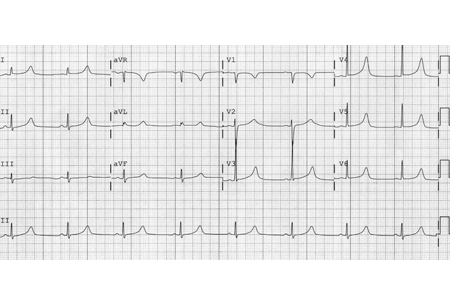Resumen
Definición
Anamnesis y examen
Principales factores de diagnóstico
- história de mutação genética conhecida
- uso de medicamentos ou circunstâncias conhecidos por aumentar o intervalo QT
- síncope durante elevações do tônus adrenérgico
- síncope durante excitação ou surpresa
- sintomas arrítmicos pós-parto
- síncope no repouso e durante bradicardia
- síncope cardíaca
- palpitações
- paralisia periódica
- características dismórficas
- surdez neurossensorial
Otros factores de diagnóstico
- tontura
- angina
- fadiga
- oligúria
- fraqueza muscular
- tetania
- dormência
- sinal de Chvostek
- sinal de Trousseau
- membros frios e pálidos
- hipotensão
- confusão
Factores de riesgo
- mutações no gene KCNQ1
- mutações no gene KCNH2
- mutações no gene SCN5A
- medicamentos que prolongam o intervalo QT
- hipocalemia
- hipomagnesemia
- hipocalcemia
- bradiarritmias
- lesões no sistema nervoso central
- sexo feminino
- desnutrição
Pruebas diagnósticas
Primeras pruebas diagnósticas para solicitar
- eletrocardiograma (ECG) para QTL1
- eletrocardiograma (ECG) para QTL2
- eletrocardiograma (ECG) para QTL3
- eletrocardiograma (ECG) para hipocalemia e hipomagnesemia
- eletrocardiograma (ECG) para hipocalcemia
- Eletrocardiograma para bloqueio atrioventricular (AV) total
- potássio sérico
- magnésio sérico
- cálcio sérico
Pruebas diagnósticas que deben considerarse
- monitor Holter
- teste de tolerância ao exercício
- ecocardiografia
- teste genético
- teste de adrenalina
Algoritmo de tratamiento
SQTL adquirida
síndrome do QT longo (SQTL) congênita sem evento cardíaco prévio
síndrome do QT longo (SQTL) congênita com evento cardíaco prévio
Colaboradores
Autores
Mehmet K. Aktas, MD, MBA
Associate Professor of Medicine
University of Rochester Medical Center
Rochester
NY
Divulgaciones
MKA declares that he has received research grants from Astra Zeneca, Medtronic, and Boston Scientific. MKA has served as consultant for Abbott and Huxley Medical. MKA holds a patent for ‘ECG Clock Electrocardiogram Based Diagnostic Device and Method’ (US patent #10,085,667). He is the author of a reference cited in this topic.
James P. Daubert, MD
Professor of Medicine
Duke University Medical Center
Duke Clinical Research Institute
Durham
NC
Divulgaciones
JPD declares that he has received honoraria for advisory boards, steering committees, data safety monitoring boards, events committees, and lecture fees from Abbott, Acutus Medical, Affera Inc., Biosense Webster, Biotronik, Boston Scientific, Farapulse, Gilead Sciences Inc., Medtronic, Microport, Phillips, and Vytronus; and research grants from Abbott, Biosense Webster, Boston Scientific, Farapulse, and Medtronic. He receives royalty payments from Wiley, Springboard and McGraw Hill for textbook authorship and educational materials. JPD declares that he has no stock, stock options, or other forms of ownership. He is the author of a reference cited in this topic.
Revisores por pares
Sami Viskin, MD
Director of Cardiac Hospitalization
Department of Cardiology
Tel Aviv Medical Center
Tel Aviv
Israel
Divulgaciones
SV declares that he has no competing interests.
Elizabeth S. Kaufman, MD
Associate Professor
Heart and Vascular Center
MetroHealth Campus
Case Western Reserve University
Cleveland
OH
Divulgaciones
ESK declares that she has no competing interests.
Agradecimiento de los revisores por pares
Los temas de BMJ Best Practice se actualizan de forma continua de acuerdo con los desarrollos en la evidencia y en las guías. Los revisores por pares listados aquí han revisado el contenido al menos una vez durante la historia del tema.
Divulgaciones
Las afiliaciones y divulgaciones de los revisores por pares se refieren al momento de la revisión.
Referencias
Artículos principales
Zeppenfeld K, Tfelt-Hansen J, de Riva M, et al. 2022 ESC guidelines for the management of patients with ventricular arrhythmias and the prevention of sudden cardiac death. Eur Heart J. 2022 Oct 21;43(40):3997-4126.Texto completo Resumen
Priori SG, Wilde AA, Horie M, et al. HRS/EHRA/APHRS expert consensus statement on the diagnosis and management of patients with inherited primary arrhythmia syndromes. Heart Rhythm. 2013 Dec;10(12):1932-63.Texto completo Resumen
Wilde AAM, Semsarian C, Márquez MF, et al. European Heart Rhythm Association (EHRA)/Heart Rhythm Society (HRS)/Asia Pacific Heart Rhythm Society (APHRS)/Latin American Heart Rhythm Society (LAHRS) expert consensus statement on the state of genetic testing for cardiac diseases. Europace. 2022 Sep 1;24(8):1307-67.Texto completo Resumen
Roden DM. Clinical practice. Long-QT syndrome. N Engl J Med. 2008 Jan 10;358(2):169-76. Resumen
Al-Khatib SM, Stevenson WG, Ackerman MJ, et al. 2017 AHA/ACC/HRS guideline for management of patients with ventricular arrhythmias and the prevention of sudden cardiac death: a report of the American College of Cardiology/American Heart Association Task Force on clinical practice guidelines and the Heart Rhythm Society. Circulation. 2018 Sep 25;138(13):e272-391.Texto completo Resumen
Sauer AJ, Moss AJ, McNitt S, et al. Long QT syndrome in adults. J Am Coll Cardiol. 2007 Jan 23;49(3):329-37. Resumen
Schwartz PJ, Moss AJ, Vincent GM, et al. Diagnostic criteria for the long QT syndrome. An update. Circulation. 1993 Aug;88(2):782-4. Resumen
Schwartz PJ, Crotti L. QTc behavior during exercise and genetic testing for the long-QT syndrome. Circulation. 2011 Nov 15;124(20):2181-4.Texto completo Resumen
Artículos de referencia
Una lista completa de las fuentes a las que se hace referencia en este tema está disponible para los usuarios con acceso a todo BMJ Best Practice.

Diagnósticos diferenciais
- Cardiopatia estrutural adquirida
- Síncope neurocardiogênica (vasovagal)
- Síncope neurológica
Más DiferencialesDiretrizes
- European Heart Rhythm Association (EHRA)/Heart Rhythm Society (HRS)/Asia Pacific Heart Rhythm Society (APHRS)/Latin American Heart Rhythm Society (LAHRS) Expert Consensus Statement on the state of genetic testing for cardiac diseases
- 2022 ESC Guidelines for the management of patients with ventricular arrhythmias and the prevention of sudden cardiac death
Más DiretrizesFolhetos informativos para os pacientes
Ataque cardíaco: o que é?
Ataque cardíaco: perguntas a fazer ao seu médico
Mais Folhetos informativos para os pacientesCalculadoras
Correção do intervalo QT
Mais CalculadorasConectar-se ou assinar para acessar todo o BMJ Best Practice
O uso deste conteúdo está sujeito ao nosso aviso legal